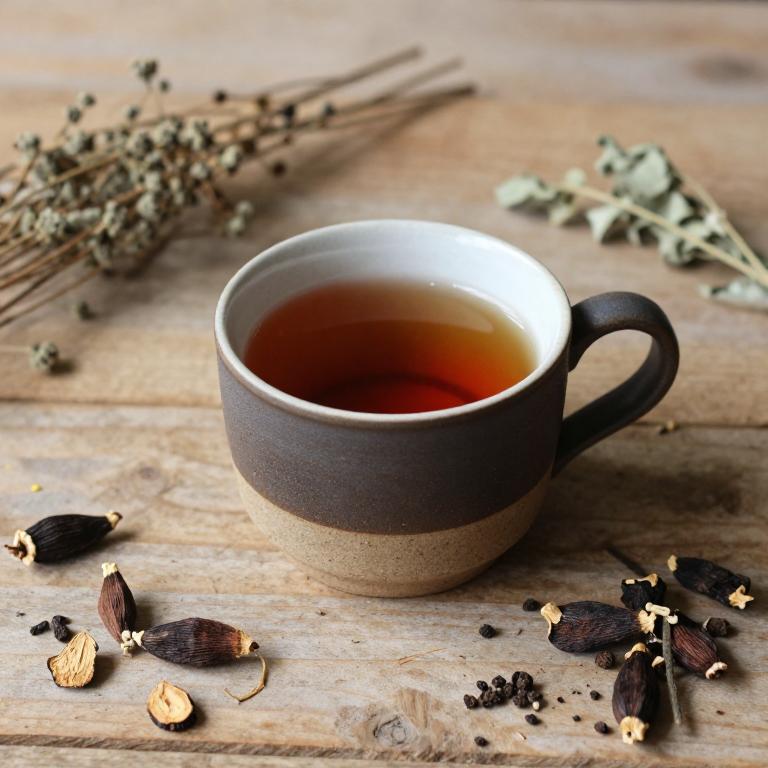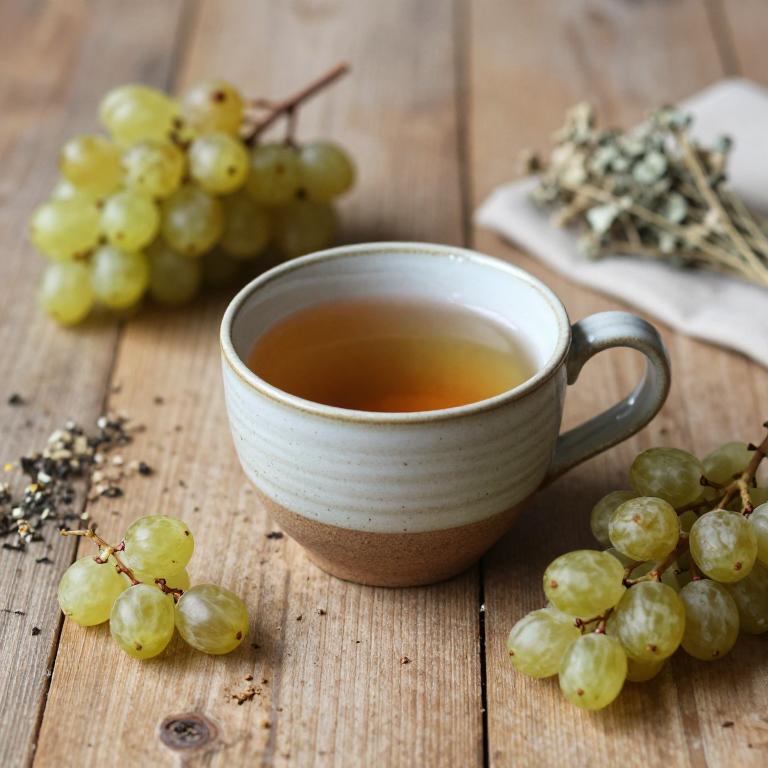10 Best Herbal Teas For Muscle Pain

Herbal teas can be a natural and soothing remedy for muscle pain, offering a gentle alternative to conventional medications.
Certain herbs like ginger, turmeric, and chamomile are commonly used in herbal teas due to their anti-inflammatory and pain-relieving properties. Ginger tea, in particular, is known to help reduce muscle soreness and improve circulation, while turmeric contains curcumin, which has strong anti-inflammatory effects. Chamomile tea can also help relax tense muscles and promote overall relaxation, making it beneficial for those experiencing stress-related muscle pain.
Incorporating these herbal teas into a daily routine may provide long-term relief and support overall musculoskeletal health.
Table of Contents
- 1. Salvia (Salvia officinalis)
- 2. Stinging nettle (Urtica dioica)
- 3. Field horsetail (Equisetum arvense)
- 4. Black pepper (Piper nigrum)
- 5. St. john's wort (Hypericum perforatum)
- 6. Blessed thistle (Cnicus benedictus)
- 7. Common grape (Vitis vinifera)
- 8. Ginger (Zingiber officinale)
- 9. Chaste tree (Vitex agnus-castus)
- 10. Turmeric (Curcuma longa)
1. Salvia (Salvia officinalis)

Salvia officinalis, commonly known as sage, has been traditionally used in herbal teas to alleviate muscle pain due to its anti-inflammatory and analgesic properties.
The essential oils in sage leaves, such as thujone and cineole, contribute to its ability to reduce swelling and soothe sore muscles. When brewed into a calming tea, sage can help ease tension and promote relaxation, making it a natural remedy for individuals experiencing muscle aches or stiffness. Regular consumption of sage tea may support overall muscle health and recovery, especially after physical exertion or injury.
However, it is advisable to consult a healthcare professional before using sage tea, particularly for those with existing medical conditions or on medication.
2. Stinging nettle (Urtica dioica)

Urtica dioica, commonly known as stinging nettle, is a herbal remedy that has been traditionally used to alleviate muscle pain and inflammation.
When prepared as a tea, it contains compounds such as flavonoids and omega-3 fatty acids that may help reduce swelling and ease discomfort in muscles. This herbal tea is often recommended for individuals suffering from conditions like arthritis, fibromyalgia, or muscle strains due to its anti-inflammatory properties. To prepare the tea, fresh or dried nettle leaves are steeped in hot water, and it can be consumed several times a day for best results.
However, it is important to consult with a healthcare professional before using stinging nettle tea, especially if you are pregnant, nursing, or taking medications.
3. Field horsetail (Equisetum arvense)

Equisetum arvense, commonly known as horsetail, is a herb that has been traditionally used for its high silica content, which is believed to support connective tissue health.
When brewed into a herbal tea, it may help alleviate muscle pain by promoting tissue repair and reducing inflammation. However, it is important to note that while some people use horsetail tea for muscle discomfort, scientific evidence supporting its effectiveness for this purpose is limited. As with any herbal remedy, it is advisable to consult a healthcare professional before use, especially for individuals with existing health conditions or those taking other medications.
Overall, horsetail tea may offer potential benefits for muscle pain, but it should be used as part of a broader approach to pain management.
4. Black pepper (Piper nigrum)

Piper nigrum, commonly known as black pepper, is traditionally used in herbal teas to help alleviate muscle pain due to its anti-inflammatory and analgesic properties.
The active compound in black pepper, piperine, may enhance the absorption of other pain-relieving substances and promote circulation, which can aid in reducing muscle soreness. When brewed into a tea, black pepper can be combined with other herbs like ginger or turmeric to amplify its therapeutic effects. Regular consumption of piper nigrum tea may support muscle recovery and reduce inflammation, making it a natural remedy for those experiencing mild to moderate muscle pain.
However, it is important to consult with a healthcare professional before using it as a treatment, especially for chronic or severe muscle conditions.
5. St. john's wort (Hypericum perforatum)

Hypericum perforatum, commonly known as St. John's wort, is a herbal remedy that has been traditionally used for its potential anti-inflammatory and analgesic properties.
When brewed into a tea, it may help alleviate muscle pain by reducing inflammation and promoting relaxation of tense muscles. The active compounds in hypericum perforatum, such as hypericin and hyperforin, are believed to interact with neurotransmitters in the brain, potentially modulating pain signals. However, it is important to note that while some studies suggest its efficacy for mild muscle discomfort, more research is needed to fully confirm its benefits.
As with any herbal remedy, it should be used cautiously and under the guidance of a healthcare professional, especially if taking other medications.
6. Blessed thistle (Cnicus benedictus)

Cnicus benedictus, also known as blessed thistle, is a herbal remedy traditionally used for its potential anti-inflammatory and pain-relieving properties.
When brewed into a tea, it may help alleviate muscle pain by reducing inflammation and supporting the body's natural healing processes. This herb is often combined with other pain-relief herbs like willow or ginger to enhance its effects. However, it is important to consult a healthcare provider before using blessed thistle, especially for those with existing medical conditions or taking medications.
While some people find relief from muscle pain with this herbal tea, more research is needed to fully understand its efficacy and safety.
7. Common grape (Vitis vinifera)

Vitis vinifera, commonly known as the grapevine, is a plant whose leaves and berries have been traditionally used in herbal teas to alleviate muscle pain.
These teas are rich in antioxidants and flavonoids, which help reduce inflammation and improve circulation, thereby easing muscle soreness and discomfort. The anti-inflammatory properties of Vitis vinifera may support muscle recovery after exercise or injury by decreasing oxidative stress. While some studies suggest potential benefits, more research is needed to confirm its efficacy for muscle pain.
As with any herbal remedy, it is advisable to consult a healthcare professional before use, especially for individuals with existing medical conditions or those taking medications.
8. Ginger (Zingiber officinale)

Zingiber officinale, commonly known as ginger, has been widely used in herbal teas to alleviate muscle pain due to its anti-inflammatory and analgesic properties.
The active compounds in ginger, such as gingerols and shogaols, help reduce inflammation and soothe sore muscles, making it a popular natural remedy for conditions like muscle strains and arthritis. Drinking ginger tea can improve circulation and promote the body's natural healing processes, providing relief from discomfort. It is often recommended as a safe and accessible alternative to over-the-counter pain medications, especially for those seeking natural solutions.
To maximize its benefits, it is best consumed warm and can be combined with other herbs like turmeric or honey for enhanced effects.
9. Chaste tree (Vitex agnus-castus)

Vitex agnus-castus, commonly known as chasteberry, is a traditional herbal remedy that has been used for centuries to support hormonal balance and alleviate various health issues.
While it is often associated with menstrual health, some studies suggest that vitex may also help reduce muscle pain by promoting relaxation and reducing inflammation. The herb contains compounds such as flavonoids and iridoids, which may contribute to its anti-inflammatory and muscle-soothing properties. When consumed as a herbal tea, vitex agnus-castus is typically prepared by steeping the dried fruit in hot water, allowing its beneficial compounds to be absorbed.
Although more research is needed to fully understand its effects on muscle pain, many people find relief from incorporating this gentle herb into their wellness routine.
10. Turmeric (Curcuma longa)

Curcuma longa, commonly known as turmeric, is widely used in herbal teas to alleviate muscle pain due to its active compound, curcumin, which possesses strong anti-inflammatory and antioxidant properties.
These properties help reduce inflammation and oxidative stress, both of which are commonly associated with muscle soreness and pain. When consumed as a herbal tea, curcumin is absorbed more effectively when combined with black pepper or healthy fats, enhancing its bioavailability. Regular consumption of turmeric tea may provide sustained relief for conditions like muscle strains, arthritis, and post-exercise recovery.
However, it is important to consult a healthcare professional before using turmeric tea, especially for individuals with existing health conditions or those taking medications.